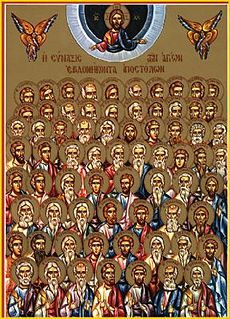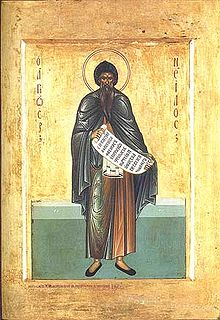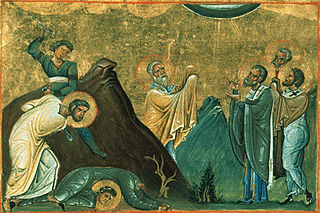
Barnabas, born Joseph (Ἰωσήφ) or Joses (Ἰωσής), was according to tradition an early Christian, one of the prominent Christian disciples in Jerusalem. According to Acts 4:36, Barnabas was a Cypriot Jew. Named an apostle in Acts 14:14, he and Paul the Apostle undertook missionary journeys together and defended Gentile converts against the Judaizers. They traveled together making more converts, and participated in the Council of Jerusalem. Barnabas and Paul successfully evangelized among the "God-fearing" Gentiles who attended synagogues in various Hellenized cities of Anatolia.
Sosthenes was the chief ruler of the synagogue at Corinth, who, according to the Acts of the Apostles, was seized and beaten by the mob in the presence of Gallio, the Roman governor, when Gallio refused to proceed against Paul at the instigation of the Jews. The motives of this assault against Sosthenes are not recorded. Some manuscripts insert the mob was composed of "Greeks"; others read "Jews".

Stachys the Apostle was the second bishop of Byzantium, from AD 38 to AD 54. He seemed to be closely connected to Andrew and Paul. Eusebius quotes Origen as saying that Andrew had preached in Asia Minor and in Scythia, along the Black Sea as far as the Volga and Kiev, hence he became a patron saint of Romania and Russia. According to tradition, Saint Andrew founded the See of Byzantium in 38, installing Stachys as bishop. This See would later develop into the Patriarchate of Constantinople, having Apostle Andrew as its Patron Saint. It was not clear if Stachys was the same person whom Paul calls "dear" in the Epistle to the Romans, but anyway, he is always associated in traditions with five other apostles that are the very same names mentioned together with him by Paul in Romans 16:8-11.

The seventy disciples or seventy-two disciples, known in the Eastern Christian traditions as the seventy apostles or seventy-twoapostles, were early emissaries of Jesus mentioned in the Gospel of Luke. The correct Greek terminology is evdomikonta (εβδομήκοντα) apostoli or evdomikonta mathetes.

Saint Nilus the Elder of Sinai was one of the many disciples and stalwart defenders of St. John Chrysostom.

January 3 - Eastern Orthodox liturgical calendar - January 5

Manahen was a teacher in the first century Christian Church at Antioch who had been 'brought up' with Herod Antipas.

Olympas was a Roman Christian whom Paul of Tarsus saluted in around 65 AD.

Urban of Macedonia is numbered among the Seventy Apostles. Along with the Apostles Ampliatus, Stachys, Narcissus of Athens, Apelles of Heraklion and Aristobulus of Britannia he assisted Saint Andrew. St. Andrew ordained Urban bishop in Macedonia. He died a martyr, and his feast day is October 31.
Narcissus of Athens is numbered among the Seventy Disciples. Along with the Apostles Urban of Macedonia, Stachys, Ampliatus, Apelles of Heraklion and Aristobulus of Britannia he assisted Saint Andrew. The Apostle Philip ordained St. Narcissus bishop of Athens. His feast day is October 31.
Apelles of Heraklion is numbered among the Seventy Disciples. Along with the Apostles Urban of Macedonia, Stachys, Ampliatus, Narcissus of Athens and Aristobulus of Britannia he assisted Saint Andrew. St. Apelles was bishop of Heraclea in Trachis. His feast day is October 31.

Aristobulus of Britannia is a Christian saint named by Hippolytus of Rome (170–235) and Dorotheus of Gaza (505–565) as one of the Seventy Disciples mentioned in Luke 10:1–24 and as the first bishop in Roman Britain.

Herodion of Patras was a relative of Saint Paul whom Paul greets in Romans 16:11. According to tradition, he was numbered among the Seventy Disciples and became bishop of Patras, where he suffered greatly. After beating, stoning, and stabbing him, they left him for dead, but St. Herodion arose and continued to serve the Apostles.

Rufus of Thebes is numbered among the Seventy Disciples in Eastern Orthodox tradition. He was bishop of Thebes in Greece, and according to some traditions is referenced in Romans 16:13. His feast day is April 8. However according to Easton's Bible Dictionary the Rufus in Romans 16 could well have been the Rufus mentioned in Mark.

Asyncritus of Hyrcania, also Asynkritos, was numbered among the Seventy Disciples. He was bishop of Hyrcania in Asia. Saint Paul mentions him in his letter to the Romans. The Church remembers St. Asyncritus on April 8.
Phlegon of Marathon is numbered among the Seventy Disciples. He was bishop of Marathon in Thrace. He is referenced in Romans 16:14, and his feast day is on April 8.

Sosipater is a person mentioned in the New Testament, in Romans 16:21. He is probably the same person as Sopater mentioned in Acts 20:4.
Fortunatus is person mentioned by St Paul in I Corinthians 16:17: I was glad when Stephanas, Fortunatus, and Achaicus arrived, because they have supplied what was lacking from you.

October 30 - Eastern Orthodox liturgical calendar - November 1

March 14 - Eastern Orthodox liturgical calendar - March 16











